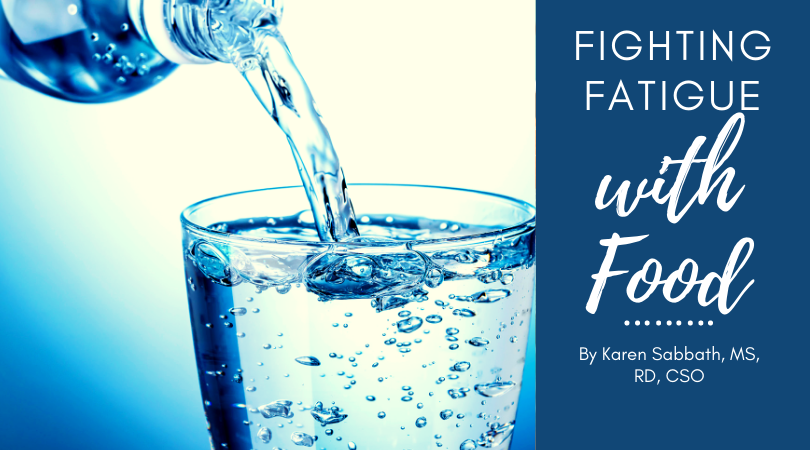Fighting Fatigue with Food
Posted on by Karen Sabbath, MS, RD, CSO
Wiped out. Pooped. Exhausted. Zero energy. I cannot move without some caffeine. Chances are you have experienced at least one of these feelings. Perhaps you have been burning the candle at both ends, or maybe you haven’t been getting enough sleep. A great nap or eight hours of sleep can often resolve the problem, but if it doesn’t, maybe you are experiencing fatigue.
 According to the Mayo Clinic, fatigue is defined as “unrelenting exhaustion that isn’t resolved by rest. It’s a nearly constant state of weariness that develops over time and reduces your energy, motivation, and concentration, which can then impact your emotional and psychological well-being.”
According to the Mayo Clinic, fatigue is defined as “unrelenting exhaustion that isn’t resolved by rest. It’s a nearly constant state of weariness that develops over time and reduces your energy, motivation, and concentration, which can then impact your emotional and psychological well-being.”
Fatigue is experienced by many people and is also a common symptom or complaint in cancer patients, particularly those going through radiation, chemotherapy, or a combination of both. Sometimes it can resolve upon completion of treatment, but often it lingers. Eating and lifestyle changes can often help your symptoms.
It’s a wise idea to discuss your fatigue with your doctor or other medical professional to make sure that there are not any underlying issues that require additional evaluation.
SOME STEPS YOU CAN TAKE TO HELP MANAGE FATIGUE:
Start your day right — don’t forget about breakfast! Easy to skip, breakfast provides the fuel you need to jumpstart your day. Eating breakfast can improve energy, concentration, and alertness throughout the day, and can actually lower risk of obesity, diabetes, and heart disease.
Try to have some combination of:
- Healthy carbohydrates for quick energy: whole grains, fruits, sweet potatoes, squash, starchy vegetables.
- Lean protein for endurance and maintenance of body tissue and the immune system: meat, poultry, fish, eggs, beans, nuts, and low-fat dairy products.
- Healthy fats for energy and satiety including olive and canola oil, avocado, and nuts.
- Fiber from fruits, vegetables, and whole grains to keep you fuller for longer and help to maintain your GI tract.
Eat smaller meals throughout the day instead of three giant meals. Your body needs to get fuel/energy throughout the day in order to function. Overeating can make us tired and can lead to obesity, which worsens fatigue. Keep in mind that a combination of healthy carbohydrates, protein, fat, and fiber will provide you with the most staying power. Avoid excessive sweets, fats, and greasy and spicy foods as well as too much caffeine.
Stay hydrated! Two thirds of your body is made up of water. Although you can live without food, your body can only survive a few days without water. Fluids help maintain body temperature, move food through the intestines, and help to produce energy. Dehydration is the major cause of low energy, since without adequate hydration the body puts all its energy into maintaining water balance within the body. Try to consume about eight or more cups of any fluid (don’t forget about the water in fruits, soups, and even oatmeal). Hydration needs increase with warm weather, exercise and a high-fiber diet. Limit your alcohol consumption, since it dehydrates the body, acts as a depressant, and can worsen fatigue.
Keep moving. Exercise if your healthcare team says it’s okay. Exercise helps to maintain muscle or lean body mass, which increases strength and energy. Light to moderate activity can decrease fatigue, including cancer fatigue.
Lower your stress. Stress and worry can worsen fatigue. Activities like yoga, meditation, deep breathing, and counseling can help to reduce stress levels and improve fatigue. Reading, painting, listening to music, or other activities that give you pleasure are often a great distraction and help to reduce fatigue.
Taking care of yourself is key to maximizing your energy and minimizing fatigue.
